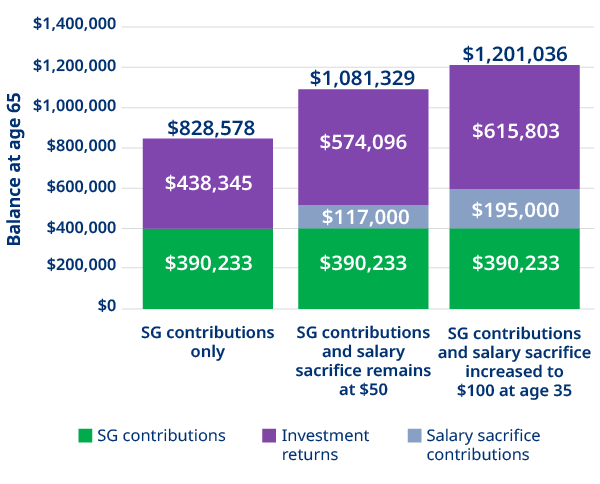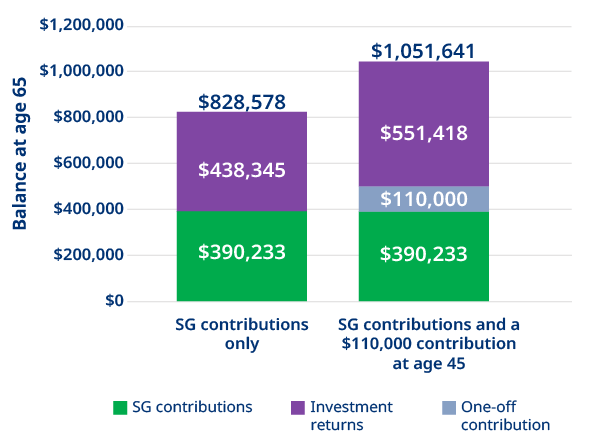As you enter and make your way through what will likely be the majority of your working life, this is the period where your super is likely to see the largest amount of growth. While this stage of life often goes hand-in-hand with other financial responsibilities such as children, mortgages and other debts, there are still opportunities to further give your super a boost.
Turn up the heat on your salary sacrifice contributions
If you’re in a financial position to do so, you could consider starting to salary sacrifice or increasing the amount you sacrifice. By sacrificing a bit more of your salary you’re helping to ensure financial security when you retire, while saving on income tax today.
Example: Small sacrifices today can mean big increases in the future – increasing your salary sacrificing amount from $50 to $100 a fortnight.1

Transform personal contributions into tax deductions
You might also consider making personal contributions from your take-home pay or other money you’ve received, such as an inheritance. You can choose to make periodic contributions or, if your situation allows, you can make one-off contributions of up to $120,000 each financial year. You may even be eligible to claim a tax deduction on some or all of these contributions.
Visit our dedicated personal contributions webpage to learn more, including how to make a personal contribution and claim it as a tax deduction.
Example: Have your money work as hard as you – $110,000 one-off contribution2

Team up with your spouse to get the most out of your super
When contributing to super most people think about putting money into their own account. In most circumstances though, people can also contribute to, or receive contributions from their spouse’s super.
This is particularly useful for couples where one is a low-income earner, has reduced hours or is taking some time out of the workforce. Depending on your circumstances the contributing spouse may also be eligible for a tax offset of up to $540.
Visit our dedicated webpage to learn more about these contributions, including eligibility criteria and how to make a contribution
Don’t hope for the best, plan for it with financial advice
As a Mercer Super member you can have access to financial advice about your super at no additional cost. Talk to us now to learn more about your options.
Read next:

Grow your super
From your first job to retirement, take steps to boost your super and secure your financial freedom.

Younger than 30: Laying the foundation
As a younger person you have one of the most powerful super building strategies available to you. You have time.

Ages 59 and beyond: Balancing withdrawals and growth
As retirement draws closer, people often look to downsize their home or work less, but not retire completely.
1. Assumptions: Superannuation Guarantee (SG) contributions commenced at age 18 in 2023 and ceased at age 65. Salary sacrifice arrangement is $50 per fortnight, commencing at age 20, increasing to $100 a fortnight at age 35 and ceasing at age 65. All future figures have been discounted for inflation. Wage growth matches inflation, except for specific age-based changes in salary, which are as follows – age 18 ($45,906), age 21 ($58,635), age 35 ($78,192), age 45 ($80,298) and age 55 ($71,417). SG rate starts at 11%, rising to 12% in 2025 as per legislative schedule. Growth oriented super based returns of 4.46% p.a. after inflation. Difference in returns (which may be positive or negative) and fees will alter the outcome. Contribution caps have been assumed not to be exceeded. The example shown may not apply to your own situation, so we recommend you consider your options carefully and seek financial advice if you’re unsure if making additional contributions is right for you. Past performance should not be relied upon as an indicator of future performance.
2. Assumptions: Superannuation Guarantee (SG) contributions commenced at age 18 in 2023 and ceased at age 65, as well as a one-off after-tax contribution of $110,000 at age 45. All future figures have been discounted for inflation. Wage growth matches inflation, except for specific age-based changes in salary, which are as follows – age 18 ($45,906), age 21 ($58,635), age 35 ($78,192), age 45 ($80,298) and age 55 ($71,417). SG rate starts at 11%, rising to 12% in 2025 as per legislative schedule. Growth oriented super based returns of 4.46% p.a. after inflation. Difference in returns (which may be positive or negative) and fees will alter the outcome. Contribution caps have been assumed not to be exceeded. The example shown may not apply to your own situation, so we recommend you consider your options carefully and seek financial advice if you’re unsure if making additional contributions is right for you. Past performance should not be relied upon as an indicator of future performance.
Disclaimer: Please note that any information in this material regarding legal, accounting or tax outcomes does not constitute legal advice or an accounting or tax opinion and prior to relying and acting on this information it is important that you seek independent advice from a qualified lawyer or accountant regarding this information.
Issued by Mercer Superannuation (Australia) Limited ABN 79 004 717 533, Australian Financial Services Licence 235906, the trustee of the Mercer Super Trust ABN 19 905 422 981 ('Mercer Super'). Any advice provided is of a general nature and does not take into account your objectives, financial situation or needs. Before acting on any advice, please consider the Product Disclosure Statement available at mercersuper.com.au. The product Target Market Determination can be found at mercersuper.com.au/tmd.
Any advice contained in this document is of a general nature only, and does not take into account the objectives, financial situation or personal needs of any particular individual. Prior to acting on any information contained in this document, you need to consider the appropriateness of the advice taking into account your own objectives, financial situation and needs.
The material contained in this document is based on information received in good faith from sources within the market and on our understanding of legislation and government press releases at the date of publication which we believe to be reliable and accurate. Neither Mercer nor any of its related parties accepts any responsibility for any inaccuracy. Past performance is not a reliable indicator of future performance.
